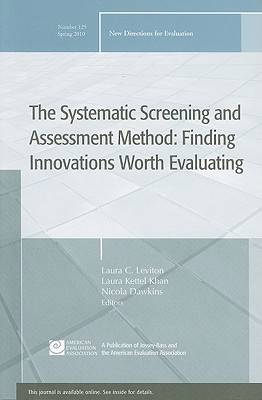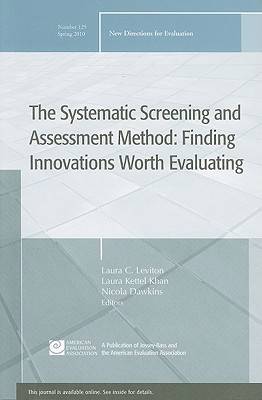
- Afhalen na 1 uur in een winkel met voorraad
- Gratis thuislevering in België vanaf € 30
- Ruim aanbod met 7 miljoen producten
- Afhalen na 1 uur in een winkel met voorraad
- Gratis thuislevering in België vanaf € 30
- Ruim aanbod met 7 miljoen producten
Zoeken
Omschrijving
The rationale, application, and outcomes of the Systemic Screening and Assessment (SSA) Method, an innovative combination of existing evaluation methods, are described. The SSA Method is a cost-effective way to assist program funders, practitioners, and researchers in selecting the most promising innovations already in use and then preparing them for further, more rigorous evaluation. The focus of the issue is methodology, with abundant practical description of its application. The SSA Method is a six-step process:
- selecting a topic or theme
- soliciting nominations of innovations that address the theme
- using an expert panel to screen these nominations for those with the highest plausibility of meeting criteria for promise
- conducting evaluability assessments on the nominations that pass this screen
- expert panel review of the evaluability assessment reports
This is the 125th volume of New Directions for Evaluation, an official publication of the American Evaluation Association.
Specificaties
Betrokkenen
- Auteur(s):
- Uitgeverij:
Inhoud
- Aantal bladzijden:
- 123
- Taal:
- Engels
- Reeks:
- Reeksnummer:
- nr. 125
Eigenschappen
- Productcode (EAN):
- 9780470623060
- Verschijningsdatum:
- 21/06/2010
- Uitvoering:
- Paperback
- Formaat:
- Trade paperback (VS)
- Afmetingen:
- 147 mm x 226 mm
- Gewicht:
- 199 g

Alleen bij Standaard Boekhandel
+ 61 punten op je klantenkaart van Standaard Boekhandel
Beoordelingen
We publiceren alleen reviews die voldoen aan de voorwaarden voor reviews. Bekijk onze voorwaarden voor reviews.











